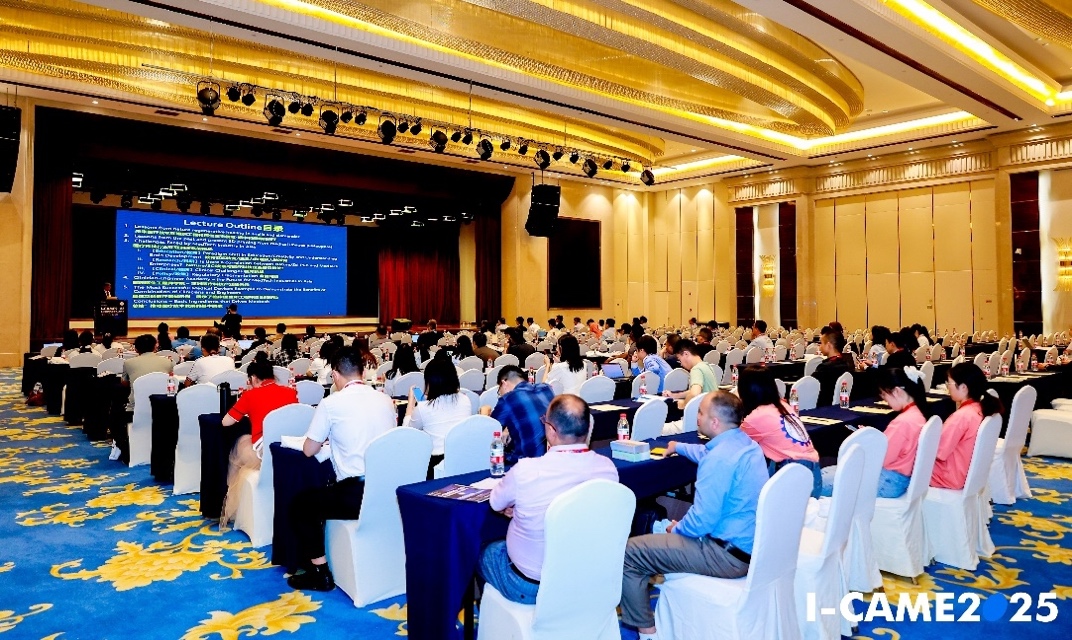The I-CAME 2025 was held in Songjiang District, Shanghai, from June 25 to 27. Themed “Advanced Materials Empowering Future Healthcare”, the event brought together over 220 experts from 16 countries and regions, including China Mainland, Singapore, the United States, Australia, Japan, the United Kingdom, South Korea, Pakistan, Hungary, Germany, the UAE, Finland, the Netherlands, India, Hong Kong, and Macao, to discuss the latest advancements in medical applications of advanced materials.
Co-organized by the National Key Laboratory of Advanced Fiber Materials, the College of Biological Sciences and Medical Engineering, the School of Food and Pharmacy at Shanghai Zhongqiao Vocational and Technical University, and the College of Materials Science and Engineering at Hunan University, the conference featured 25 cutting-edge sessions. These covered diverse fields such as preclinical and clinical trials of biomaterials, biomaterial synthesis, tissue regeneration and repair research, tissue scaffold fabrication, and cell biology.

(Conference Scene)
At the opening ceremony, Vice President Lu Weibing delivered a welcome speech and introduced the profile of DHU. He expressed his hope that the conference would serve as a vital platform for international experts and scholars in advanced medical engineering to exchange ideas and foster the development of related disciplines at the university. Professor Swee Hin Teoh, Co-Chair of the conference and Academician of the Singapore Academy of Engineering, provided an overview of the history of the International Conference of Advanced Medical Engineering. Professor Liu Xuanyong, Dean of the College of Biological Sciences and Medical Engineering at DHU, delivered remarks and introduced the college’s achievements. Professor Mo Xiumei, Chair of the conference and faculty member at the College of Biological Sciences and Medical Engineering, presided over the opening ceremony.

(Vice President Lu Weibing delivers the welcome speech)

(Introduction to the I-CAME2025 by Swee Hin Teoh)
The conference featured eight invited plenary lectures by globally renowned experts. Professor Joseph Vacanti from Massachusetts General Hospital, USA, delivered an online presentation on whole-organ manufacturing and its latest research advancements. Professor Wong Tien Yin, Dean of Tsinghua University Medical School, discussed the challenges and future directions of artificial intelligence (AI) in healthcare. Professor Changsheng Liu, President of Shanghai University and Academician of the Chinese Academy of Sciences, shared his research achievements and clinical applications in bone regenerative materials. Professor Hanry Yu from the National University of Singapore introduced tissue-engineered models for drug development, while Professor Yanan Du of Tsinghua University presented his work on tissue fibrosis reconstruction and regulation. Professor Xiaohua Zhou from Peking University explored accuracy evaluation methods for AI-based medical devices in the absence of a gold standard. Professor Michael Wagels from Australia highlighted the industrialization of next-generation bioresorbable implants. Finally, Professor Swee Hin Teoh shared his insights on the future of MedTech innovation in Asia.

(Award Ceremony for Best Poster)
In addition, the conference program featured 35 keynote lectures, 53 invited talks, 45 oral presentations, and 40 poster presentations. Ten outstanding contributors were honored with the "Best Poster Presentation Award", presented during the closing ceremony. The conference will also spotlight entrepreneurship, with ZRX-Entrepreneurship Awards, recognizing outstanding young professionals driving innovation. The inaugural awards recognized 2 gold, 2 silver, and 3 bronze laureates for their groundbreaking work in scientific commercialization.


